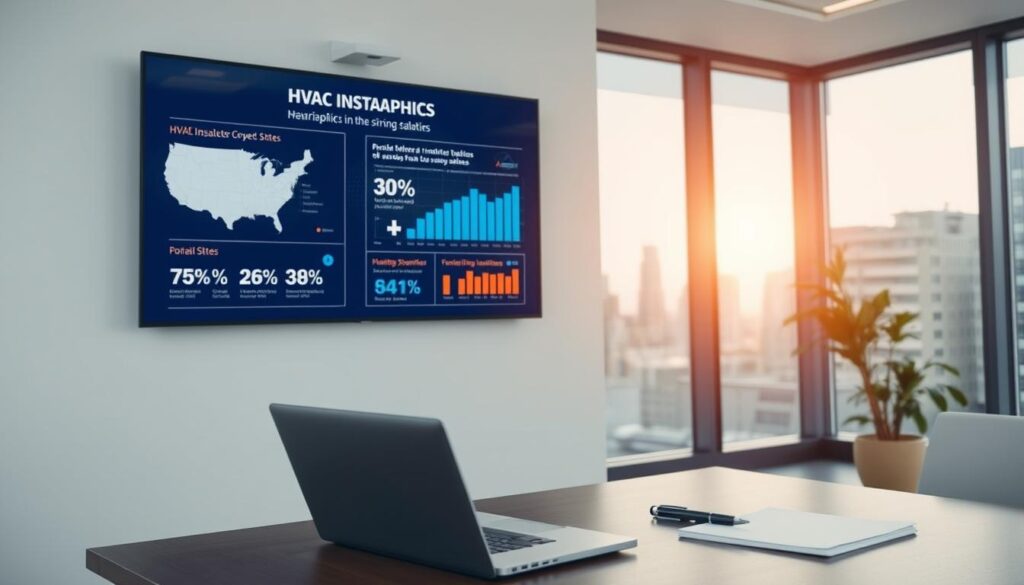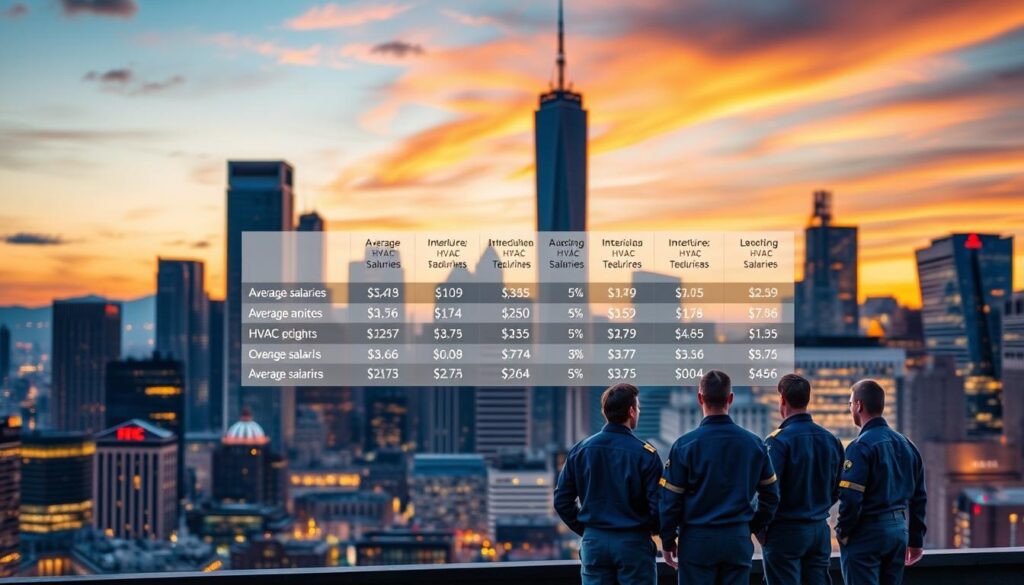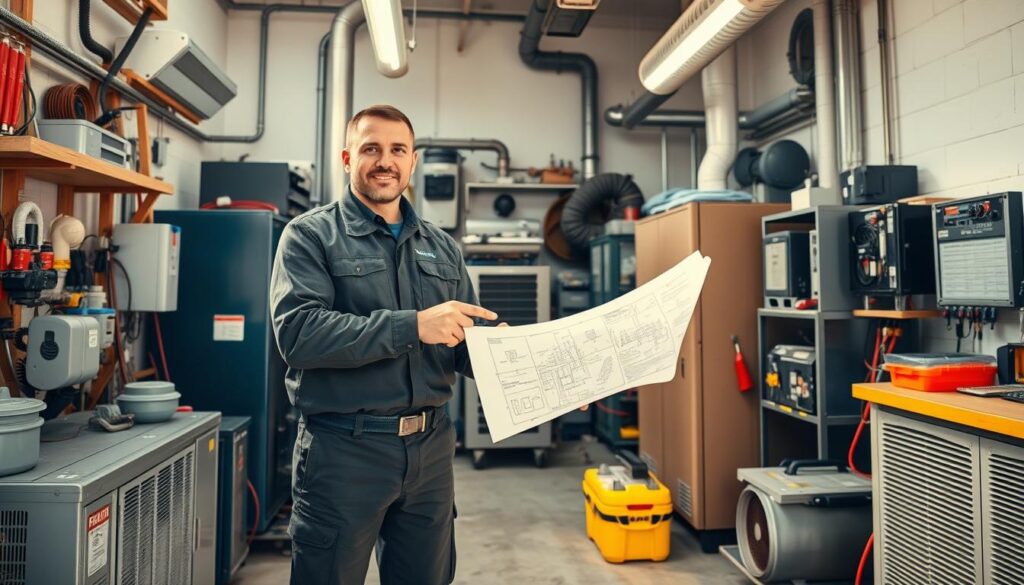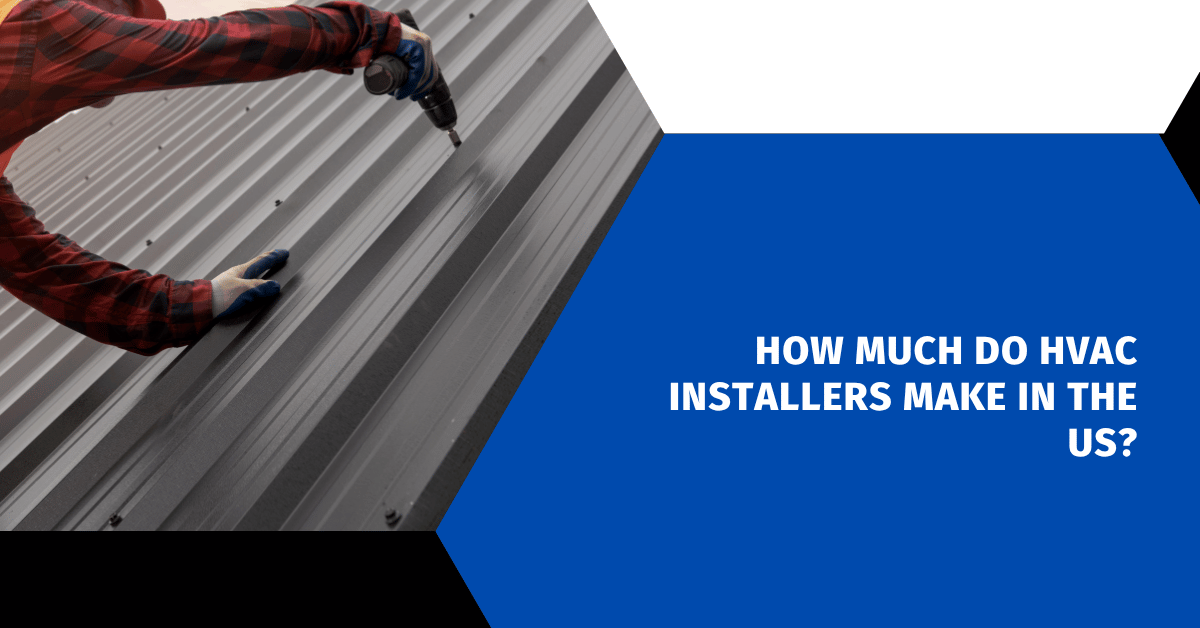Affiliate Disclosure
HVAC Guide Guys is a participant in the Amazon Services LLC Associates Program, an affiliate advertising program designed to provide a means for sites to earn advertising fees by advertising and linking to Amazon.
Are you wondering how much HVAC installers earn? The heating, ventilation, and air conditioning field is booming. It offers great jobs with salaries that might surprise you.

In 2024, HVAC installers make an average of $49,500 a year. This makes it a great career for those who love technical work and hands-on tasks. Knowing how much HVAC installers earn can help you understand this exciting field.
The need for skilled HVAC workers is rising. This is due to new buildings, upgrades, and efforts to save energy in homes and businesses. Your salary can change based on your experience, where you work, and your special skills in HVAC.
Key Takeaways
- Average HVAC installer salary is $49,500 annually
- Growing job market with increasing demand
- Earnings can vary by experience and location
- Technical skills open up many career paths
- There are many ways to move up in your career
Table of Contents
Understanding HVAC Installation Career Prospects
The HVAC installation industry is booming. It’s a great field for those who love technical work. With buildings getting more complex and energy efficiency key, hvac technician earnings are on the rise.
The job market for HVAC pros is growing fast. The U.S. Bureau of Labor Statistics says there will be thousands of new jobs soon. This is across many different sectors.
Job Market Growth and Demand
Your future in HVAC looks very promising. There’s a steady rise in demand for skilled workers:
- Expected job growth of 5% annually
- Over 37,000 new HVAC jobs anticipated by 2024
- Increasing need for energy-efficient systems
Required Qualifications and Certifications
To do well in hvac installation pay, you need certain skills:
- High school diploma or equivalent
- Technical training or apprenticeship program
- State-specific HVAC certification
- EPA refrigerant handling certification
Career Path Progression
Your HVAC career can grow in several ways:
| Career Stage | Typical Responsibilities | Potential Earnings |
|---|---|---|
| Entry-Level Technician | Assisting senior technicians | $35,000 – $45,000 |
| Experienced Installer | Independent installations | $50,000 – $65,000 |
| Senior Technician | Complex system design | $70,000 – $85,000 |
Keep learning and specialize to increase your earnings in HVAC.
Explore Our HVAC Shop
Looking for top-rated HVAC tools, parts, and accessories? Visit our shop and find the perfect solution for your needs.
Visit the ShopNational Average HVAC Installer Salary Overview
Understanding the HVAC industry’s earnings is key to making smart career choices. Your salary as an HVAC installer can change a lot based on several important factors. The national HVAC tech wages offer great chances for skilled workers.
Entry-Level and Experienced Pay Dynamics
At the start of your HVAC career, you can earn between $21,500 and $35,000 a year. As you get more experience and skills, your pay can go up a lot.
- Entry-level technicians: $21,500 – $35,000
- Mid-career professionals: $45,000 – $65,000
- Experienced senior technicians: $70,000 – $96,000
Salary Progression with Experience
Your earnings will grow a lot as you gain more experience. Most HVAC installers see a big pay increase in their first five years.
| Experience Level | Annual Salary Range |
|---|---|
| 0-2 Years | $21,500 – $35,000 |
| 3-5 Years | $35,000 – $50,000 |
| 6-10 Years | $50,000 – $70,000 |
Performance-Based Compensation Opportunities
Many HVAC companies give extra pay beyond just a base salary. You might get bonuses, commissions for hard jobs, or rewards for great customer service.
Your hourly rate is usually about $23.80. But, top performers can earn much more by growing their skills and specializing.
How Much Do HVAC Installers Make By State
Exploring how much HVAC installers make shows big differences across states. Salaries vary a lot due to local economy, demand, and living costs.
Top-paying states for HVAC pros include:
- California: Offers some of the highest wages in the industry
- Nevada: Competitive compensation due to extensive industrial and residential projects
- New York: Strong market with robust construction and renovation sectors
- Massachusetts: High demand for skilled HVAC technicians
- District of Columbia: Premium salaries for specialized installation work
While these states offer high salaries, chances exist everywhere. Both rural and urban areas offer unique earning chances for skilled workers.
Factors affecting HVAC installer salaries by state include:
- Local construction activity
- Energy efficiency regulations
- Climate and seasonal needs
- Regional economic health
- Technological infrastructure development
Remember, individual earnings can vary based on experience, certifications, and specialized skills beyond geographic location.
Explore Our HVAC Shop
Looking for top-rated HVAC tools, parts, and accessories? Visit our shop and find the perfect solution for your needs.
Visit the ShopTop-Paying Cities for HVAC Installation Professionals
Your earnings as an HVAC technician can change a lot based on where you work. Some cities pay much more, making where you live very important for your career.

The U.S. shows big differences in what HVAC techs make, depending on where they are. Some cities are better for making more money in this field.
Metropolitan Areas with Highest Salaries
Here are some top cities for HVAC techs:
- San Francisco, California: Offers the highest entry-level salaries at $64,200 annually
- New York City, New York: Provides competitive wages around $60,600 for new technicians
- Seattle, Washington: Boasts strong compensation packages for HVAC professionals
- Boston, Massachusetts: Demonstrates robust demand for skilled technicians
Cost of Living Considerations
High salaries are great, but think about living costs too. A high salary might not cover the cost of living in these cities.
| City | Average Salary | Cost of Living Index |
|---|---|---|
| San Francisco | $64,200 | 269.3 |
| New York City | $60,600 | 187.2 |
| Seattle | $57,500 | 172.3 |
| Boston | $55,800 | 181.4 |
Urban vs Rural Pay Differences
Urban and rural areas pay differently. Urban areas usually have higher salaries because of more demand and complex jobs. Rural areas might have lower costs and more overtime.
Planning your career means looking at more than just salary. You need to think about the whole financial picture of your location.
Experience Levels and Salary Progression
Your salary as an HVAC installer can really change with experience. The trade rewards your skill and growth. Knowing how your pay will grow helps plan your career.
Starting HVAC installers earn less but can make more as they gain experience. They learn the basics and get hands-on experience first. At this point, they might earn between $40,000 and $55,000 a year.
- Entry-Level (0-2 years): $40,000 – $55,000
- Mid-Level (2-4 years): $55,000 – $70,000
- Experienced (4-7 years): $70,000 – $85,000
- Senior/Specialized (7+ years): $85,000 – $100,000+
As you get better, you can earn more. Technical skills and learning are key. Getting good at complex systems and energy-saving tech can raise your value.
Learning advanced skills like commercial refrigeration or green tech can speed up your pay growth. Those who keep learning and get special certifications often earn more quickly.
Explore Our HVAC Shop
Looking for top-rated HVAC tools, parts, and accessories? Visit our shop and find the perfect solution for your needs.
Visit the ShopFactors Affecting HVAC Installer Earnings
Knowing what affects how much HVAC installers make is key to planning your career. HVAC technician earnings go beyond just a base salary. They depend on many important factors.
Your income in the HVAC field is influenced by several key factors. These can greatly affect your total earnings.
Education and Certification Impact
Investing in your skills can really boost your hvac technician earnings. Getting advanced certifications and specialized training can lead to higher pay.
- Trade school certification: 10-15% salary increase
- EPA certification: Possible $2-5k annual bonus
- Advanced technical credentials: Up to 25% higher wages
Industry Specializations
Not all HVAC installation jobs are created equal. Some specializations can significantly increase your earnings.
- Commercial HVAC systems: Higher complexity, better pay
- Industrial refrigeration: Specialized skills mean higher rates
- Green technology installations: Growing market with good salaries
Company Size and Type
Your employer greatly affects your earnings. Big national companies usually offer better pay than small local ones.
Planning your career wisely means understanding how work environments impact your income.
By choosing the right career path, continuing your education, and focusing on specializations, you can increase your HVAC technician earnings. This will help you build a successful career.
Benefits and Additional Compensation
When you think about hvac installation pay, there’s more than just a salary. Your total compensation package as an HVAC installer includes many valuable benefits. These benefits greatly increase your overall income.
HVAC installer income isn’t just about your monthly paycheck. It also includes benefits that support your career and personal well-being. Common benefits include:
- Health insurance coverage
- Dental and vision plans
- Retirement savings programs
- Paid time off
- Performance-based bonuses
Many HVAC companies offer financial rewards for skilled technicians. Performance bonuses can be from $500 to $5,000 a year. This depends on your work and how happy your customers are. Employers also give extra pay for:
- Complex installation projects
- Emergency service calls
- Advanced certification achievements
- Referral programs
Overtime is another way to increase your hvac installation pay. Experienced installers can earn more for weekend and holiday work. This can add a lot to your income.
Investing in your professional development can directly translate to increased earnings and more extensive compensation packages.
Your total compensation as an HVAC installer is more than just a salary. It includes benefits and incentives that value your skills and dedication to the field.
Explore Our HVAC Shop
Looking for top-rated HVAC tools, parts, and accessories? Visit our shop and find the perfect solution for your needs.
Visit the ShopCareer Growth and Income
The HVAC industry offers great chances for growth and high earnings. Starting as an HVAC professional can lead to a rewarding career. It goes beyond just entry-level jobs.

Your earnings can rise as you gain more experience. Skilled technicians can find many ways to increase their income. This is through making smart career choices.
Advanced Roles and Responsibilities
Career growth in HVAC leads to many high-paying jobs:
- Project Management Roles
- System Design Specialists
- Technical Training Instructors
- Senior Maintenance Coordinators
Business Ownership Opportunities
Starting your own HVAC business can greatly boost your income. Independent contractors often earn substantially more than regular employees.
- Launch a private HVAC consulting firm
- Develop specialized service contracts
- Create niche market expertise
Continuing Education Benefits
Investing in ongoing education can greatly increase your earnings. Getting certifications and advanced skills can lead to better-paying jobs in HVAC.
- Advanced technical certifications
- Specialized equipment training
- Energy efficiency expertise
- Smart home technology integration
By carefully planning your career, you can turn your HVAC training into a high-paying job. It offers a lot of room for growth.
Conclusion
An HVAC career is a great choice for those looking for a stable job. It offers good pay and is always in demand in the U.S. You can start at the bottom and work your way up to more technical roles.
Your earnings in HVAC installation depend on a few key things. Experience, certifications, where you work, and your specialty all play a part. If you keep learning and get better at what you do, you can earn more and move up in your career.
The HVAC field is always changing with new tech and energy-saving needs. This means there’s always a need for skilled workers. Choosing this career means you’re picking a field that’s safe from economic downturns and offers real job security.
Thinking about your career? Remember, an HVAC job is about more than just the money. It’s about building a lasting career. With hard work, technical skills, and smart planning, you can make a good living and find true fulfillment in this important trade.

